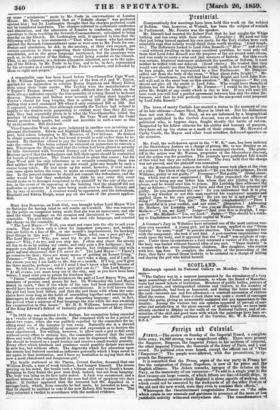Comparatively few meetings have been held this week on the
subject of Reform. One, however, at Walsall, has been the subject of remark in Parliament. Mr. Forster was the speaker.
Mr. Disraeli had taunted Sir Robert Peel that he had caught the Whigs bathing and run away with their clothes. (Laughter.) He need not fear that jest being turned against his own party, for the Tory clothes were such miserable rags that nobody would think them worth stealing. (Loud laugh- ter.) The Reformers looked to Lord John Russell—("Hear !" and cheers)" —and without dwelling on his many excellent qualities, be need only tel them that Lord John Russell was the proposer of the six-pound ratal clause, and was ready to carry a wise and just measure of Reform. But this much was certain, whatever statesman undertook the question of Reform, ft must neither be trifled with nor delayed. (Loud cheers.) He trusted that they would very shortly see that Englishmen would, both in fact and in thought, be free people, and be represented by a- free Parliament. Mi. Duignan called out from the body of the room, " What about John Bright ? " Mr. Forster—" Gentlemen, you will find that John Bright and Lord John Rus- sell will sail in the same boat on this question." Mr. Duignan—" But you should not give all the credit to Lord John. Who would have thought of Reform but for John Bright ? " Mr. Forster—" I would be the last to de- prive Mr. Bright of any credit which is due to him. If you will wait till next week you will find a perfect agreement between him and the other Re- formers, and that he will perfectly concur in the six-pound ratal proposed by Lord John Russell."
The town of merry Carlisle has erected a statue to the memory of one of its late citizens—James Steel, Mayor in 1845-46. But his distinction does not rest there. Mr. Steel, as we are informed by a biographical memoir published in the Carlisle Journal, was an editor and an honest politician who, in bygone days, fought stoutly the battle of reform. Respected by his fellow citizens for his ability and honesty of purpose, they have set up his statue as a mark of their esteem. Mr. Howard of Carby Castle, the Mayor and other local notables, delivered speeches on the occasion.
Mr. Frail, the well-known agent in the " W. B." case, has been indicted at the Shrewsbury Assizes on a charge of giving 30a. to one Bentley as an inducement to Bentley to vote for him in a municipal election. The plain- tiff in the action was Mr. Watton, proprietor of the Shrewsbury Tournal„ and the action was for penalties. The journals have published full details of this trial but they are without interest. The Jury held that the charge was not proved, and the plaintiff was nonauited.
At the Merionethshire Assizes the following scene took place at the close of a trial. The Clerk of the Court asked—" Do you find the prisoner, David Williams, guilty or not guilty ?" Foreman—" Not guilty." (Great cheer- ing, which was at once suppressed.) The Judge requested the officers of the court to bring any one before bun whom they saw joining in the ap plause, and he would send him to prison. His Lordship then addressed the Jury as follows—" Gentlemen, you have said that you find the prisoner not- ,uilty. Do you understand the case ? Do you understand that it is your duty to say whether or not this man received hie employers' moneys and applied them to his own purposes ? Do you say he is not guilty of so doing ?" Foreman—" Yes, Sir." The Judge (emphatically)—" Then I am thankful it is your verdict, and not mine." (Sensation.) Addressing Mr. Mathew, his Lordship said, "Are you an Englishman, Sir ?" Mr, Mathew—" I am, my Lord." Judge—" And your firm is English, I sup- pose ?" Mr. Mathew—" Yes, my Lord." Judge—" This should be a warn. mg to Englishmen not to invest their capital in Wales."
A Coroner's Jury in Wiltshire have returned one of the most curious ver- dicts ever recorded. A young girl, yet in her teens, applied to one " Gram Godwin" for some "stuff" to procure abortion. The woman supplied her with the compound ; she took it and died. A post-mortem examination was made upon the body, and it appeared that the "stuff" was sulphate of cop- per. Under these circumstances a Jury returned a verdict of fele de se, and the body was buried without funeral rites of any sort. " Gram Godwin" is a woman who has seven illegitimate children. Her daughter, who resides with her, haa four. To complete the absurdity of the proceeding of the Jury, they have caused Gram Godwin to be arrested on a charge of killing and slaying the girl who killed herself.


























 Previous page
Previous page